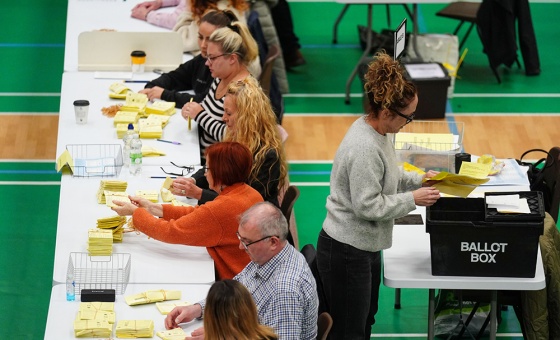This is the last article you can read this month
You can read more article this month
You can read more articles this month
Sorry your limit is up for this month
Reset on:
Please help support the Morning Star by subscribing here
THOUSANDS of vulnerable children are receiving poorer-quality meals as caterers cut food standards to cope with crippling price rises, a survey suggests.
The poll of school dinner providers shows many are having to resort to cheaper options to fill stomachs, such as processed food, prompting calls for the government to urgently increase funding.
Food prices have risen by 30 per cent since May 2022, according to the research released today by school caterers’ association Laca.
The group surveyed school meal providers responsible for feeding 1.8 million pupils across 9,874 schools in England and Wales.
It found that more than nine in 10 were experiencing food shortages with bread, fish, cheese, pasta and potatoes the items most affected.
To cope with cost pressures and food shortages, 28 per cent of caterers said they were now using more processed foods such as packet mixes and frozen sauces instead of using fresh ingredients.
Thirty-eight per cent said they were considering sourcing meat from abroad rather than Britain.
And just over half said they expected the quality of school meals to continue getting worse over the coming weeks and months.
Laca, which represents more than 3,000 school food providers and deliver three million lunches in 22,000 schools every day, warned that the school dinner industry is “on its knees.”
Chairman Brad Pearce said: “The challenges facing our industry are set to get worse over the coming weeks and months.
“Without an increase in school meal funding the most vulnerable children in our society will go without, possibly, their only hot, healthy and nutritious meal of the day.”
Schools currently receive £2.41 for universal infant free school meals (UIFSM) and £2.41 for free school meals (FSM).
Laca is calling for the government to increase funding per meal for young and older children annually and in line with inflation.
“We are also urging the government to raise the FSM entitlement threshold to all children whose parents are on universal credit, to ensure that no child misses out on a school lunch,” Mr Pearce added.
“A hungry child cannot learn, but for too many children this could soon become their reality.”
Last month, the government increased funding for UIFSM by 7p. But campaigners said the uplift was “just not enough.”
Teachers’ union NEU warned that schoolchildren’s health was being put in jeopardy due to a lack of government funding for school meals.
Responding to Laca’s survey, NEU general secretary Kevin Courtney said: “NEU figures show that government have cut the money spent on school meals by 25 per cent in real terms since 2010.
“Every child should have a healthy meal every day so they can concentrate in class and thrive.
“But as this research and our own figures show, school meal providers are having to do more with less. This is putting the health of our schoolchildren in jeopardy.”
He echoed calls for school meal funding to rise in line with inflation for all schools, and to roll out the benefit for all primary schoolchildren “rather than cutting standards at the detriment of children’s health.”
A government spokesman said: “We have expanded access to free school meals more than any other government in recent decades, which currently reach 1.9 million children.
“We are also supporting schools with £53.8 billion in core funding this year and a £4bn increase in overall funding from 2021 to 2022.”










